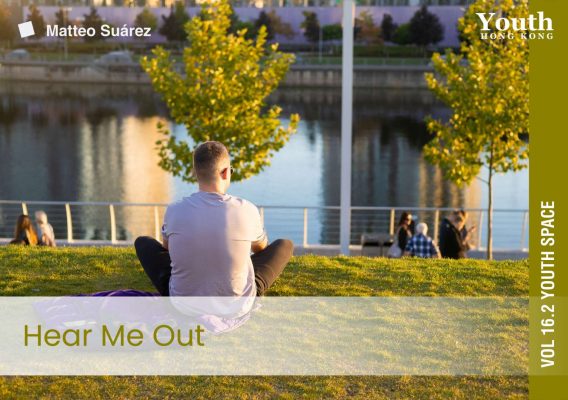//16.2 Youth Space: Mental Health
Hear Me Out
by Matteo Suárez
By simply listening with intention, we can reconnect ourselves with the richness of the present moment.
I have been practising mindfulness for about 10 years and over that time, I have learnt different techniques on how to reduce stress, elevate moods and increase focus. One thing that I have come to rely on is listening.
Every day we use our ears to navigate the world around us, but do we use them to appreciate it?
Come share an experience with me. It is mid-morning, and we are standing in an open-air market. All around us is a buzz and constant chatter; but that is all it is: buzz and chatter. We have filtered out the unfamiliar and hear clattering footsteps as an indistinct rumble. The old church bell rings out 10 times, but we have not registered its weighty echo.
For most of the day, we allow our brain to decide what we listen to. It selects the sounds it finds important and disregards the rest. This allows us to go about unburdened by having to constantly think of what it is we’re listening to. However, we should not let this automatic function pass uncontested.
Listening mindfully – not to be confused with the conversational practice of mindful listening – is when we allow ourselves to deliberately register and observe sounds. This is a practice, I believe, that provides numerous benefits, including regulating mental health, improving focus and increasing self-awareness.
Yet, instead, we filter out the sounds we do not need, and when that is not enough, we block them out entirely through music, social media, and other distractions. I am not immune to taking solace in distraction. Dull moments make me anxious. I start to think about work, and if I do not have work, I start thinking about work to come.
The question I ask myself every time I leave home is, “Do I have my headphones?” I need them to listen to music which stimulates me. Without them, the world sounds dead. I know how being present can be uncomfortable, which is a very daunting thing. What I am realising, however, is that avoiding discomfort results in something even more detrimental: disconnection.
Disconnection doesn’t allow us to experience life fully. We need the connections to reality, which is fundamental to human existence. It is understood that mental instability does occur with people who become completely disconnected from the world. The irony, of course, is that the constant availability of distractions, normalises our disconnection!
So, what should we do? I believe that, on occasion, we can reconnect to life if we just listen.
There is a very simple joy to listening. If we let ourselves stop for a moment to deliberately observe and register the sounds that we hear, we might very well feel a sense of calm. Instead of noises, we might hear something else: the sound of people, animals or machines, resonating and dissipating sound in a sonic dance.
Once again, come share an experience with me. We’re standing in an open-air market. The morning sun peers over grand clouds. Men, women, and children dressed in hand-spun fabrics stomp in wooden shoes across wet grass and cobblestone streets. Thud thud, clomp clomp. The fruit seller yells, a dog barks, and the little boy selling hats, rings his bell. As we listen, as we try to name every new sound, as we attempt to recognise their origins, the “disturbance” now has meaning.
So, let me encourage us all to take off our headphones and listen. Let the world sing. Hear the old church bell ring out 10 times. ■
Matteo Suárez is an 18-year-old student from the Harbour School graduating this year. He has lived in Hong Kong his whole life and loves writing, comic books, and sunny days.



